Downloads
Alternate Energy Systems, Inc. offers a wide variety of options and accessories for virtually any LPG system, installed in commercial, industrial, or utility applications. Accessory components which are not manufactured by AES, are sourced from reputable manufacturers, and are modified and tested at AES to meet our stringent quality and performance criteria. This guarantees long lasting customer satisfaction, even for the most critical of today's LPG applications.
If you need a particular accessory, option or enhancement for your system and can not find it in this brochure, call our sales department! We may already have a product design available for immediate delivery, or we may be able to modify an existing design to meet your needs, or we could simply design a new product specifically for you. In any case, all options and accessories offered by AES are supported by our total commitment to customer satisfaction.
Scroll through this page, or click on any of the links below to go directly to that section:
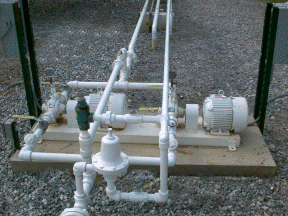
Typical Dual Pump System
LPG Transfer Pumps
LPG Transfer Pumps, as the name implies, are used to transfer LPG from the storage tanks to the vaporizer. In systems with venturi LPG/air mixing systems, they are also responsible for maintaining the pressure needed for optimum and efficient function of the venturi tubes.
All pumps are mounted on steel skids, and are primed and painted. They are equipped with constant pressure regulator, strainer, isolation valves, by-pass loops, liquid filled pressure gauges, and any other components required for safe operation.
Smaller pumps up to 18 GPM are for single phase AC 115/230 V service. Larger pumps are for 3-phase AC 230/460 V and require external motor starters. Pumps up to 31 GPM are direct drive pumps (electric motor directly coupled to pump). Larger pumps are belt driven
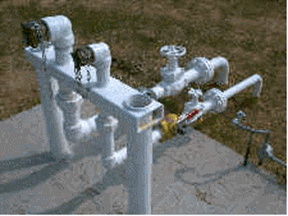
Typical Truck Unload Station
Truck Unload and Cylinder Fill Stations
Truck Unload Stations are used to transfer LPG from supply trucks to the storage tank(s). AES truck unload stations are designed to be anchored in a concrete foundation. They come complete with liquid transfer line and vapor return line. They are equipped with control valves, excess flow valves, vent valves, backcheck valves, and breakaway couplings. Emergency Shutoff Valves (ESV) with pull cable and Nitrogen-operated ESV are available as an option.
Cylinder fill stations, i.e. for filling of forklift cylinders, can be supplied separately, or integrated with the truck unload station.

2 inch Test Flare
Flare Burner Heads (Test Flares)
Test Flares are used during system setup, and for periodical system tests and maintenance. They act as large loads, and allow the system to be tested under real life load conditions.
AES manufactures standard test flares with 2” gas line, or with 3” gas line. Larger flares for bigger systems are available as customer specials. All AES test flares are equipped with automatic ignition, standing pilot, and steel weather cap. Electronic Flame Safeguard and Flame Arrestors are available as options.
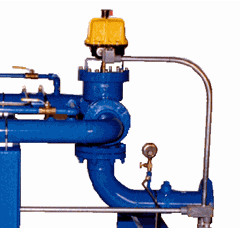
POM with Valve Actuator
Automatic Specific Gravity Control
Automatic specific gravity control systems are designed to work in combination with AES’ patented POM mixers in LPG/air mixing installations, i.e. in standby plants or peak shaving plants. They are used in in installations where the composition of the LPG may vary over time or from shipment to shipment. The output signal from an in-line gravitometer, calorimeter, O2 sensor, or other device that measures the properties of the mixed gas, is routed into a dedicated PID controller. This controller sends an adjustment signal to an actuator, installed on top of the POM mixing valve, which changes the rotational position of the piston until the properties of the mixed gas are again within preset values.
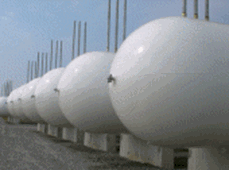
Typical Tank Farm with 30,000 gallon tanks
LPG Storage Tanks
AES does not manufacture LPG storage tanks. However, through many years of close cooperation with major tank manufacturers, we are able to offer tanks at very competitive pricing. Due to ever-ongoing changes in the industry, and the fact that LPG storage tanks have typical useful lives of 40 years or more, we very often can offer used tanks as a cost saving alternative. New LPG storage tanks come with factory test certificates; used tanks are tested and re-certified during installation.
As important as the tank itself are the piers, the concrete structures the tanks are installed on. AES recommends and installs pre-cast concrete piers from reputable manufacturers.
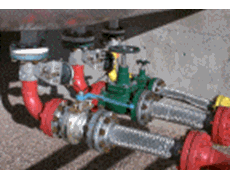
Photo of lower portion of
typical tank trim.
Tank Trim and ESVs
New or used, LPG storage tanks must be fitted with “Trim”. These are valves and fittings, safety relief valves, excess flow valves, liquid withdrawal ports, tank level indicators and transmitters, pressure gauges, thermometers, etc. to meet the safety requirements of NFPA, and the information and convenience requirements of the operators. Emergency Shutoff Valves (ESVs) are installed between truck unload stations and the storage tanks, and in the liquid withdrawal line(s) of the tank(s). They are activated by pull-cables, or through a Nitrogen-operated pneumatic system.
The actual configuration of tank trim and ESVs depends on the particular requirements of the installation. Contact AES for more information.
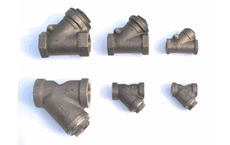
Typical Strainers and Check Valves
Strainers and Filters
Strainers are installed in the liquid LPG supply line to the vaporizer, and are designed to remove solid contamination in the LPG, i.e. sand, rust, or other debris. AES carries strainers for all common pipe sizes from 3/4 inch to 6 inch. Larger strainers are available as a customer special.
In addition to solid contaminants, Coalescent Filters are designed to remove moisture and unwanted by-products from the refining process, so-called “heavy ends”, from the LPG. AES manufactures coalescent filters for the liquid phase of the LPG (PLF series) and models for the vapor phase (PVF series). All coalescent filters come complete with 300# ANSI flange connections, and manual drain valve for accumulation removal.

Different Style Ball Valves
and Globe Valve
Ball Valves and Globe Valves
Valves are installed in various places on a LPG vaporizer or LPG/air mixing system. Depending on the job the valve is designed to do, less expensive ball valves or more expensive, heavier globe valves are used. The main difference between both valve types is in the design of the sealing mechanism: Ball valves are very simple in design and rely on the smooth finish of the center ball after a 90 degree turn to seal. Globe valves are more complex, and create a positive seal by blocking the flow of the fluid with a solid “lid”. At similar valve size, ball valves offers greater flow rates, while globe valves offer the advantage of creating a positive seal. At similar flow rates, globe valves are considerably larger and heavier.
All standard globe or ball valves used by AES are UL listed for LPG service.
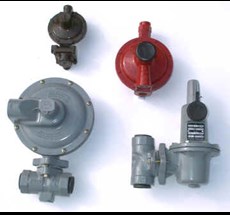
Various pressure regulators
Service Regulators
After vaporization, LPG vapor exits the vaporizer at the pressure of the liquid supply line. This pressure, either tank pressure or discharge pressure from a pump, may be too high for existing distribution pipelines and must be reduced to the system service pressure (thus, the name Service Regulator).
Size and type of the service regulator is a function of pressure, flow rate, ambient temperature, and line size. AES offers service regulators from several manufacturers, i.e. Fisher and REGO, in a wide range of sizes, matched to the vaporizer or vaporizer/mixer size.

Schematics of Xomos Valves
3-Way-Valves
The main application for 3-way valves is with LPG/air mixing systems, used as standby systems. They are installed in the main natural gas supply line, and allow the LPG/air mixing system to seamlessly take over the gas supply without interrupting the process. This is achieved through the use of a rotating piston, which gradually opens the input side for the LPG/air mixture, while simultaneously closing off the natural gas side.
For fully automated systems, 3-way valves can be equipped with electric or pneumatic actuators, allowing the operator to remotely switch from natural gas supply to the standby system.
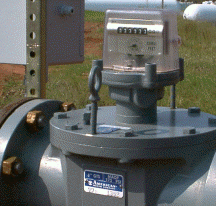
6-inch Flow Meter
Flow Meters and Flow Computers
In many installations it is important to know the flow rate of the gas produced by a vaporizer, or vaporizer/mixer system. AES offers mechanical, electro/mechanical, and electronic units.
In many installations it is important to know the flow rate of the gas produced by a vaporizer, or vaporizer/mixer system. AES offers mechanical, electro/mechanical, and electronic units.
Flow meters with electronic output signals can be connected to Flow Computers, where actual flow is corrected for temperature and pressure. The output signal of the meter or the computer can also be used to control Flow Control Valves (see below).
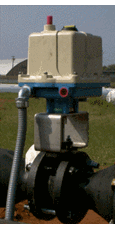
Flow Control Valve
with electric Actuator
Flow Control Valves
Flow Control Valves are used to limit the flow through a pipeline. Standard applications include the protection of LPG/Air systems from overload conditions (which could potentially shut the system down), and natural gas “Peak Shaving”. In Peak Shaving applications the amount of gas that is drawn from a natural gas line is controlled to stay within contractual agreements. If the usage would be allowed to exceed contract amounts, the user (i.e. gas utility) will be assessed hefty penalties by the pipeline operator.
AES carries flow control valves for various sizes and pressures. They can be manually adjustable, fixed pre-set, or fully automatic.
